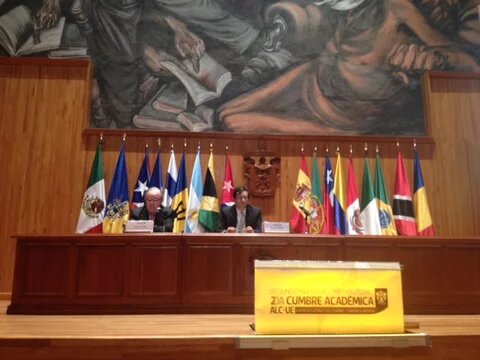The academic institutions of Latin America, the Caribbean and the European Union met in Guadalajara for the Second Preparatory Seminar of the II EU-LAC Academic Summit, and reiterate their will to participate actively in the consolidation of the Euro-Latin American and Caribbean Space for Higher Education, a main pillar of the EU-CELAC Strategic Partnership.
This Preparatory Seminar provides continuity to the work done in the four preceding academic events, and it is an improvement towards the fulfilment of the Santiago Declaration goals. The objective is to assess the concerted proposals, deepening and broadening their perspectives, as well as incorporating new actions.
The Seminary included the following activities:
- Opening statements by government academic authorities and organisms from both regions;
- Panels with exhibitions and presentations by renowned academics on each of the scopes to be included in the programme;
- Groups of dialogue and analysis of the same scopes;
- Roundtables with the intention of analysing the interuniversity cooperation programmes and projects of the two regions, and
- A session of results and conclusions.
In the Seminary specific topics were addressed, such as Higher Education, Science, Technology and Innovation; which were focused into the following four areas:
- Strengthening the integration of the Higher Education systems
More efforts are required to ensure the convergence and harmonization of the criteria in order to ensure quality. To enable the sharing of standards, which in turn will facilitate the recognition of studies, it is deemed necessary to increase cooperation. With regards to this, the Bologna process is considered a possible example to follow.
- Promoting the integration of the systems of scientific research, technology and innovation
More cooperation between the universities of both regions is suggested. In order to achieve this, the following possibilities are analysed: 1) To open the European publications to the Latin American and Caribbean universities, 2) To make progress with the recognition of university degrees and postgraduate diplomas in the different countries of both regions, and 3) To set up an inter-regional agency to certify the quality of the studies.
- Collaboration between the Institutions of Higher Education and their relations with society, in particular with the productive sector
It is proposed to disseminate and promote University – Business cooperation, recognising the needs of the micro, small and medium-sized enterprises within the knowledge development by the Institutions of Higher Education. In order to achieve this, it is proposed to generate links between the Academic Summit and the Business Summit.
- Linking the Academic Community with public policy
With regards to this objective, it was agreed to four points;
- The importance of the policy-making process is recognised, as well as the need of increasing the participation of different actors in it.
- In the mentioned process, the academics have an indispensable role. The contribution of the academic community is a key tool in order to influence the process.
- The Academic Summits can play a key role in providing Higher Education institutions a more central role in the epistemic communities.
- The need of the EU-CELAC Higher Education Institutions to construct a space of bi-regional academic cooperation is recognised. These institutions have a strategic role in the consensus.
The results and conclusions of the Preparatory Seminary are the basis for the Second Academic Summit that will be celebrated in June 2015 in Brussels on the occasion of the II CELAC-EU Summit.
